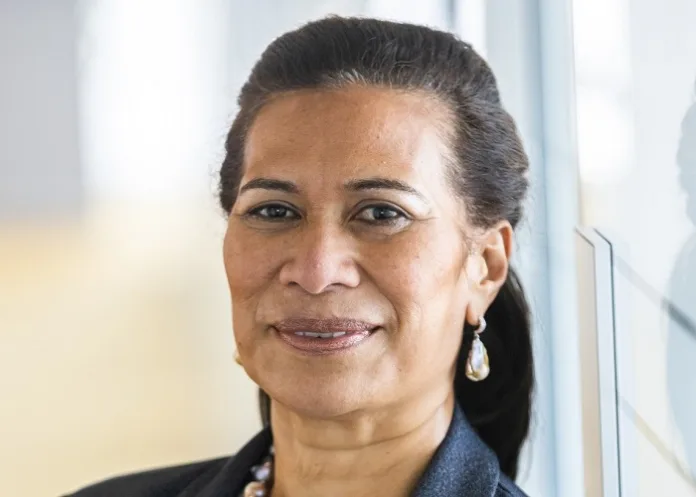The most senior nurse in the world says a crucial issue facing the workforce was the growing reliance on international recruitment to plug staffing gaps, and has called for a new approach to the problem which considers both individual nurses and struggling healthcare sectors.
Chief nursing officer (CNO) of the WHO, Dr Amelia Latu Afuhaamango Tuipulotu, also said it’s time to change the historic undervaluing of the profession, and for all governments to “listen to the voice of nurses”, particularly amid pay disputes happening worldwide.
Tuipulotu – who has been in the post for seven months – said now was the right time “for empowerment, recognition, value and respect for nurses and midwives”.
“We must care for them – the nurses and midwives,” she told Nursing Times. “We must make sure they have decent pay and working conditions, we must enable them to work to the full extent of their scopes of practice, and we must have more nurses in senior health positions.
"These are key (parts) of the solutions for the issues facing by nurses.”
A common thread worldwide is the “historical undervaluing of the profession” through issues like poor pay, she added.
“Now is the right time for us to unite to change that.”
She urged governments “to listen to the nurses’ and midwives’ voices and perspectives”, that these are the people on the front lines delivering the care, despite overwork, long hours and burnout.
“Leaders must come to fully understand the conditions in which nurses are working… and the impact of the decisions for fair pay and fair conditions.
“If the profession feels it is undervalued and disrespected – historically and after the pandemic – how will that affect the nurses themselves, their confidence and how they value their work? We really have to see the whole picture… the ripple effect of decisions we make.”
Tuipulotu described her time thus far in the role as “a major step up” in her career.
Previously, she was the CNO for her native Tonga – a country comprising around 170 islands in the southern Pacific Ocean – between 2014 and 2019.
She was then appointed as the first female Health Minister in Tonga, a post she held for two years, when she led the country’s coronavirus pandemic response, before joining the WHO.
“I had been working for one country and now I have to work for 194 member states, and the billions-strong population of the world,” she remarked.
Tuipulotu acknowledged that another crucial issue facing the workforce was the growing reliance on international recruitment to plug staffing gaps.
“International recruitment has been really challenging, particularly after the emergency phase of the pandemic,” she said.
Currently, the WHO has a red list comprising 55 countries identified as facing the most pressing workforce shortages and which should, therefore, not be targeted for systematic recruitment by international employers.
Of these, 37 countries were in the WHO’s Africa region, while the remainder were in its Eastern Mediterranean, Southeast Asia, Western Pacific, and the Americas regions.
Despite the WHO’s warnings, many high-income countries, including the UK, continue to fill vacancies with nurses from countries on the red list.
The CNO noted that it was important to “see the perspectives (of) the healthcare professionals” who are migrating to other countries.
“Of course, there are the issues regarding healthcare professionals and nurses, and their own rights to be able to migrate. So we must all …see the picture very clearly, as we will be called to be accountable into the future.”
When asked whether the red list was fit for purpose, she said the organisation only “issues guidelines” so it was, ultimately, up to individual countries to take note of the recommendations and adhere to them.
“However, if our actions are unethical – which may solve a short-term problem for now – it will not be the best solution for us in the long term.”
In addition, she called on nurses, nursing associations and governments from all countries, “to discuss openly international recruitment and the need for ethical recruitment”.
“It’s always very important that we look at a situation, map it out carefully, see the potential impact, on the population, of our decisions and our actions – and I think we will come up with the right solutions and strategies.”
High-income countries that continue to benefit from international recruitment could be encouraged to invest back into source countries, to support them to maintain their domestic workforce, she suggested.
“We have to think outside the box about other options so …there is a fair contribution back to the source country,” she said.
However, she emphasised that every country needed to invest in its nursing workforce.
“Investment must be done globally, everywhere. We must be able to do it together. as one team. The world must work in solidarity.”
See more from MedicalBrief archives:
Private sector frustration as nursing staff flock to greener pastures
SA nursing under threat as UK, Canada lure staff to address crippling shortages
UK spending billions to cope with 40,000 nursing staff shortage
Global nursing crisis deepens as pandemic and staff shortages wreak havoc
Nursing vacancies in England set to double in next 10 years

